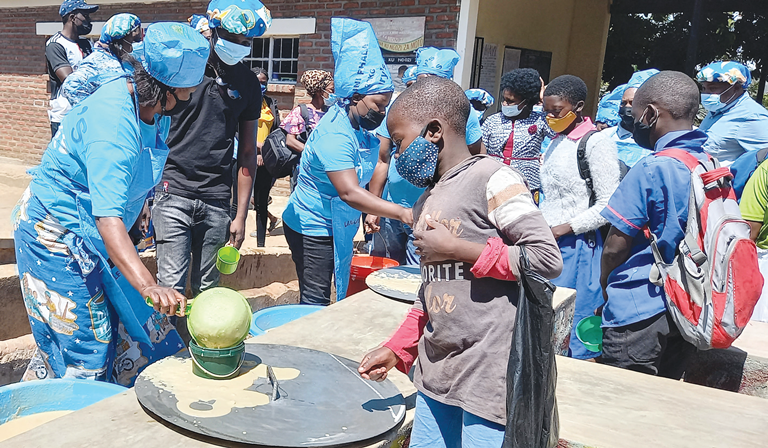Feeding one million children in Malawi
In 2002, Magnus MacFarlane-Barrow visited Malawi for charity work when he met Edward, 14, who told him: “I require enough food to go to school one day.”
Touched by the agony of the boy in poverty, the founding chief executive officer of Mary’s Meals desired to give every needy child at least a meal every school day.

The result is a school-feeding programme credited with improving children’s health as well as school enrolment, performance and retention.
Now, the charity feeds an incredible one million Malawian children, up from 200.
This makes Malawi home to the world’s largest school-feeding programme which provides daily porridge made from maize and soya porridge fortified with essential vitamins and minerals to 989 primary schools in 24 of the country’s 28 districts.
This is a stitch in time for Nellie Maluwa, a Standard Six pupil at Mbayani One Primary School, who dreams of becoming a medical doctor.
“Although I take breakfast before coming to school, it doesn’t last. By 9am, I feel hungry and the porridge keeps me strong until we knock off. It’s yummy,” she says, holding a cupful of porridge.
The school meals are pivotal to the global push to end malnutrition and hunger by 2030.
The Malawi Demographic and Health Survey (MDHS) of 2015 shows that at least one in every three children is stunted, a sign of severe malnutrition which kills a quarter of Malawian children.
The same year, the Cost of Hunger study by the African Union with support from the United Nations’ Economic Commission for Africa and the World Food Programme found that 1.4 million children were stunted and unlikely to reach their full potential as adults.
The findings show that the country loses almost $600 million (about K490 billon) every year due to under-nutrition.
Bulla Mbwana, the headteacher at Mbayani One Primary School says school meals have become a life-changing necessity as many children go to school on an empty stomach because their parents cannot afford a meal.
About 70 percent of the population in Malawi lives in poverty and hunger bites hard during the lean period from October to March.
The Malawi Vulnerability Assessment Committee estimates that some 1.5 million—about eight percent of the population—will require food aid by the next harvest.
Every day, Mbayani, one of the country’s most populous primary schools, prepares 25 pots of porridge a day for 8 470 learners. Each pot requires 20 kilogrammes of nutritious flour.
Mary’s Meals country director Angela Chipeta Khonje calls for transformative partnership with well-wishers, including the private sector, to finance the school meals for the benefit of all vulnerable children.
“It costs K19 000 to feed a child throughout the school year,” she says.
Chipeta-Khonje calls for greater investment to ensure that no child is left behind in the programme which has “helped improve school enrolment, learners concentration in class and ensured academic progression”.
Last year, the UN Children’s Fund (Unicef) reported that 49 percent of the country’s population are children with about 2.5 million aged below five and 8.8 million under 18. They are expected to complete primary school aged 14, but many do not.
Despite a significant reduction in malnutrition, the MDHS shows that 37 percent of the children are stunted while three percent are wasted.
President Lazarus Chakwera recently launched the Scaling Up Nutrition 3.0 programme and communication strategy to end child malnutrition.
He pledged that government would allocate adequate resources to strengthen nutrition operations and systems nationwide. The President also committed to placing nutritional officers in all local councils.
Chakwera expressed worry that in spite of progress made, Malawi still has one of the world’s highest levels of stunting levels.
While government and its partners are working to roll back hunger and malnutrition, there is still a long way to go.
Chipeta-Khonje says: there is a need for collaboration in supporting children like Edward and Nellie achieve their goals.





